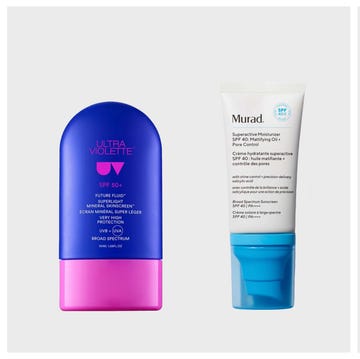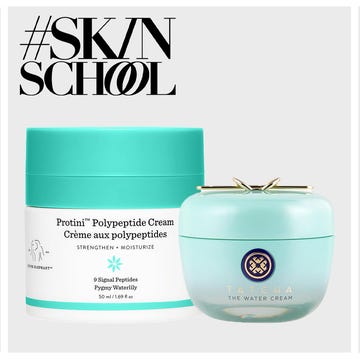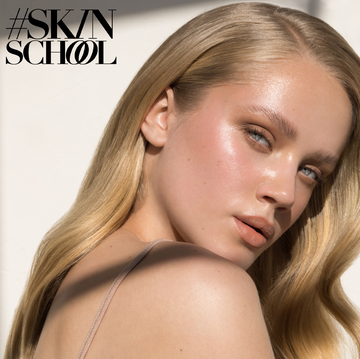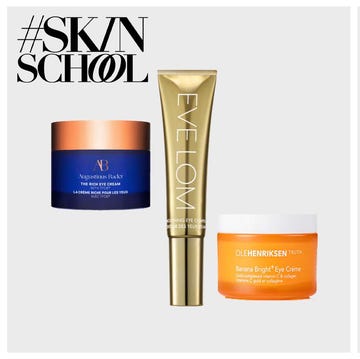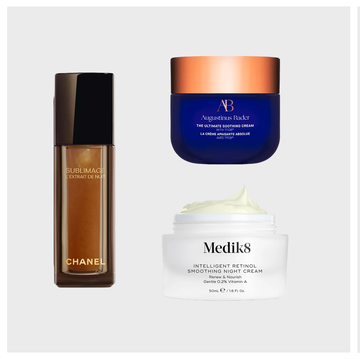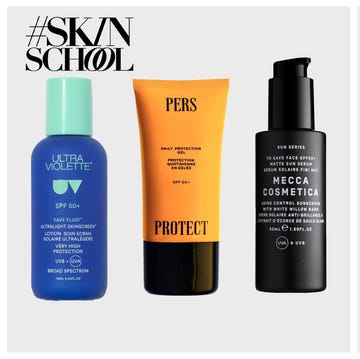We earn a commission for products purchased through some links in this article.
The best retinol eye creams for brighter, smoother eyes – and how to use them
Retinol is the gold-standard for maintaining plump skin. Here's how to reap the benefits without the unwanted side effects.
Retinol, a vitamin A-derivative, is a dermatologist's favourite clinically proven ingredient for diminishing fine lines, lifting slack skin and brightening the complexion. Found in various products, from face serums to retinol body lotions, this potent ingredient can sometimes lead to unwanted side effects (think flaky skin and irritation) when used incorrectly, so it's no surprise that many are still wary about using retinol around the eyes.
The very best retinol eye creams
Is it safe to use retinol on the eye area?
The skin around the eyes is thinner and more delicate, hence it is more susceptible to sensitivity and irritation. It also means that wrinkles generally form around the eye area first. While the appearance of fine lines is completely normal (and doesn't need reversing), if you are looking to plump them out, retinol is an excellent ingredient to do so - when used properly.
"It is generally safe to use retinol on the under-eye area, but it must be approached with caution," agrees the consultant plastic and reconstructive surgeon Dr. Georgina Williams, who also founded the ultra-chic skin clinic, Montrose London.
What to look for in a retinol eye cream
This is the one instance where it is worth investing in a targeted retinol eye cream. "Choose a formulation specifically designed for sensitive areas and start with a lower concentration to gauge your skin's tolerance," says Dr Williams. You'll notice that modern formulas often use 'encapsulated' or 'time/slow-release' retinol. This means that the ingredient is activated gradually within the skin to avoid aggravating the complexion. Skin-fortifying ingredients such as hydrating butters, peptides, squalane and ceramides will also strengthen the skin while nourishing it.
What are the benefits of a retinol eye cream?
Just like for the rest of your face, retinol will help stimulate collagen production which helps to minimise fine lines. Dr Williams adds: "Retinol also aids in increasing cell turnover, which can improve skin texture and tone, potentially brightening the under-eye area and reducing the appearance of dark circles. With consistent use, retinol can contribute to a more rejuvenated appearance."
When to start using a retinol eye cream
Considering how sensitive the eye area is and the potency of retinol as an active ingredient, dermatologists agree that the best time to start is from your mid-twenties to your early thirties. Anyone younger should steer clear (unless advised by a medical professional, not a skin-fluencer) to avoid compromising delicate skin.
That said, it's never too late to start your retinol eye cream. Great formulas are packed with nourishing ingredients alongside retinol, which means even the most mature complexions can reap its benefits.
How to use a retinol eye cream
Always start slowly and with a low concentration, every two or three evenings, to help your skin build tolerance. If all looks good over the next few weeks, you can start increasing the frequency. "Take a tiny amount and gently dab it onto the skin, going up as far as the orbital rim (where the bone of your eye socket is) avoiding going up any further than that," says Dr Williams, who's also a fan of the 'sandwiching' method. "Apply a hydrating, simple eye cream as an undercoat before and after applying the retinol to create a protective barrier and minimise potential dryness or irritation."
It goes without saying but since retinol degrades in sunlight (thus minimising its benefits), it's best to use it in the evening. It can also make your skin more sensitive to UV rays following use which is why the grey days of winter are a great time to start including retinol in your skincare routine. That said, always protect your skin with SPF, no matter the weather or season.
If you do notice any redness, peeling, or irritation, give the product a break and check in with a skincare professional if the reaction persists.
Ahead, the beauty editor-approved retinol eye creams to try









![La Roche-Posay Redermic [R] Retinol Eye Cream La Roche-Posay Redermic [R] Retinol Eye Cream](https://hips.hearstapps.com/vader-prod.s3.amazonaws.com/1724427076-la-roche-posay-eye-cream-66c8ab1f06c20.png?crop=0.894452347083926xw:1xh;center,top&resize=980:*)




